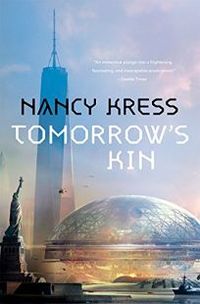Tomorrow's Kin by Nancy Kress
 Wednesday, July 19, 2017 at 10:01AM
Wednesday, July 19, 2017 at 10:01AM 
Published by Tor Books on July 11, 2017
Irrational hatred of aliens is common enough in America. An irrational hatred of space aliens fuels Tomorrow’s Kin, a first contact novel that has Americans and most of world’s population blaming aliens for problems they did not cause. Although the aliens are of human origin, Nancy Kress’ point (I assume) is that irrational hatred of the “other,” stoked by politicians, may be inevitable in a country that prefers bumpkin logic to rational thought.
The other important theme in Tomorrow’s Kin is the fragility of an ecosystem. The sudden removal of one species from the Earth may have a devastating impact on the world economy, for reasons that Kress illustrates convincingly.
The novel’s central character is Marianne Jenner, who has published a paper outlining her discovery of a new haplogroup of mitochondrial DNA. Her publication party is interrupted by FBI agents who want to escort her to the president, something that regularly happens in science fiction novels and thrillers when a scientist’s knowledge is urgently needed, particularly when space aliens are involved. The aliens are in orbit, but they build a floating embassy, surrounded by an energy shield, in New York Harbor. The aliens, known to Earth folk as the Deneb, want to meet Marianne. Hence the urgent need for government agents to summon her.
Marianne’s son Noah is dependent on sugarcane, a drug that gives him confidence in his personality, although the personality differs every time he takes it. Her daughter Liz is an isolationist who has bought into “America first” propaganda, which suits her role as an overzealous border patrol officer. Her son Ryan works for a wildlife organization and argues with Liz about the benefits of globalization. The offspring play varying roles of importance as the novel progresses, and at least two of them will presumably play some role in later volumes.
We quickly learn that the Deneb are descendants of Earth, members of the haplogroup Marianne discovered. And we quickly learn that they’ve come to Earth to save it, much to the consternation of isolationist Liz (who views them as illegal aliens) and ecologist Ryan (who views them as an invasive species). The threat to Earth comes from a cloud of spores that is drifting toward Earth. The Deneb hope to find a way to save Earth because the same cloud will swarm their own planet a couple of decades later.
To avoid spoilers, I won’t say much more about the plot, apart from the fact that it is set up by the Deneb visit but otherwise doesn’t have much to do with the Deneb. In fact, the story loses some of its steam once the Deneb depart, although it does set up short-term and long-term threats to the Earth (mostly from stupid humans). Ensuing volumes will no doubt follow characters into space, which is something I will look forward to seeing.
There is a certain amount of family drama, followed by relationship drama, in Marianne’s life, but it contributes to the story without overwhelming it. There are also a bunch of children who are learning to cope with … skills? disabilities? … that have been genetically unlocked in their minds. That aspect of the story is more interesting than a conspiracy involving a rich guy, which has some good moments but is too much like other conspiracy stories to generate much excitement.
Some storylines are left dangling, and not all of the plot threads cohere, so I wouldn’t recommend this as a stand-alone, although the ending isn’t a cliffhanger. I suspect the entire trilogy will be a more satisfying reading experience than Tomorrow’s Kin standing alone. I may need to revise my opinion after reading the rest of the trilogy, but I can guardedly recommend Tomorrow’s Kin as a moderately interesting beginning to a story that, I hope, will become even more interesting as it develops.
RECOMMENDED
